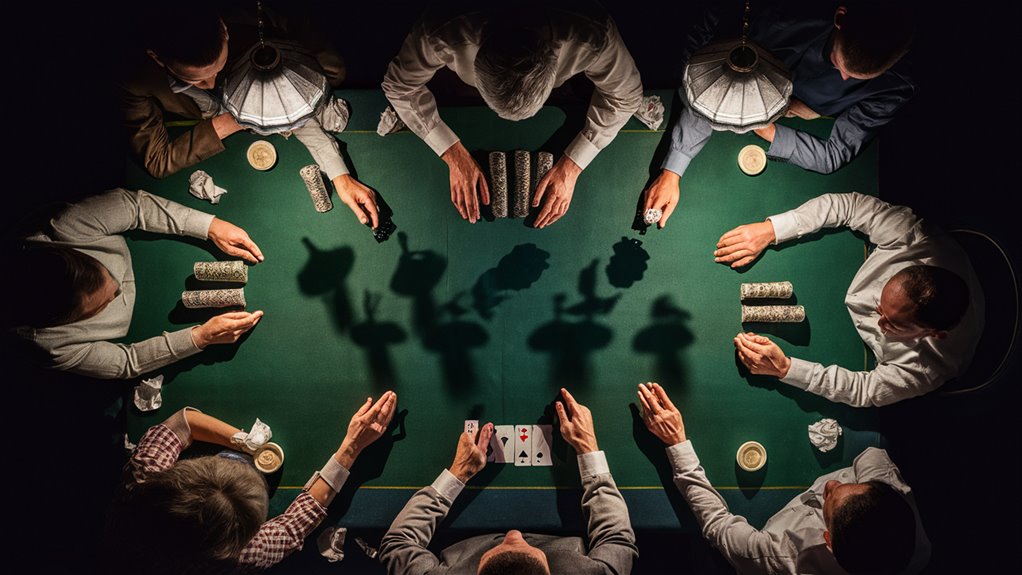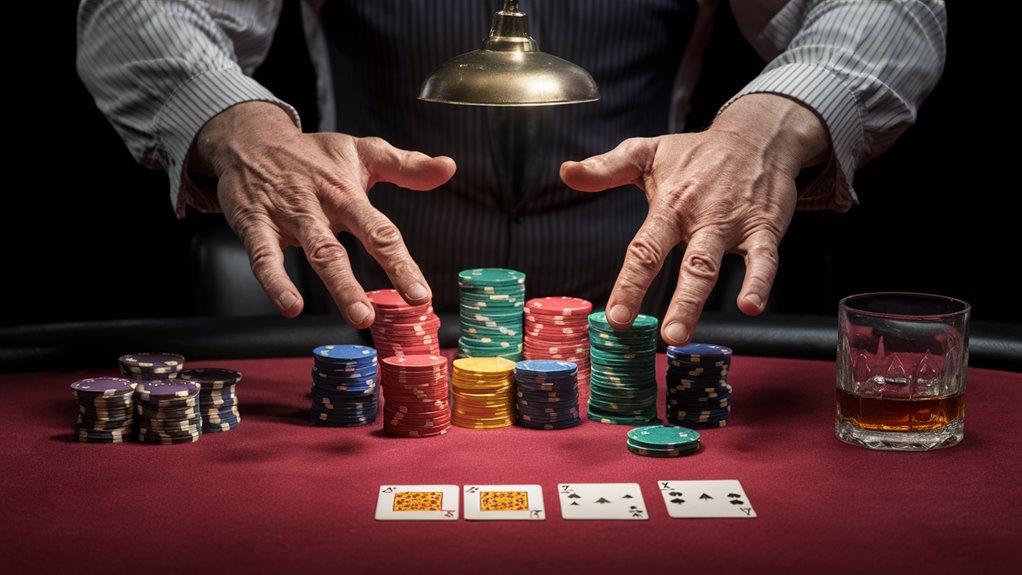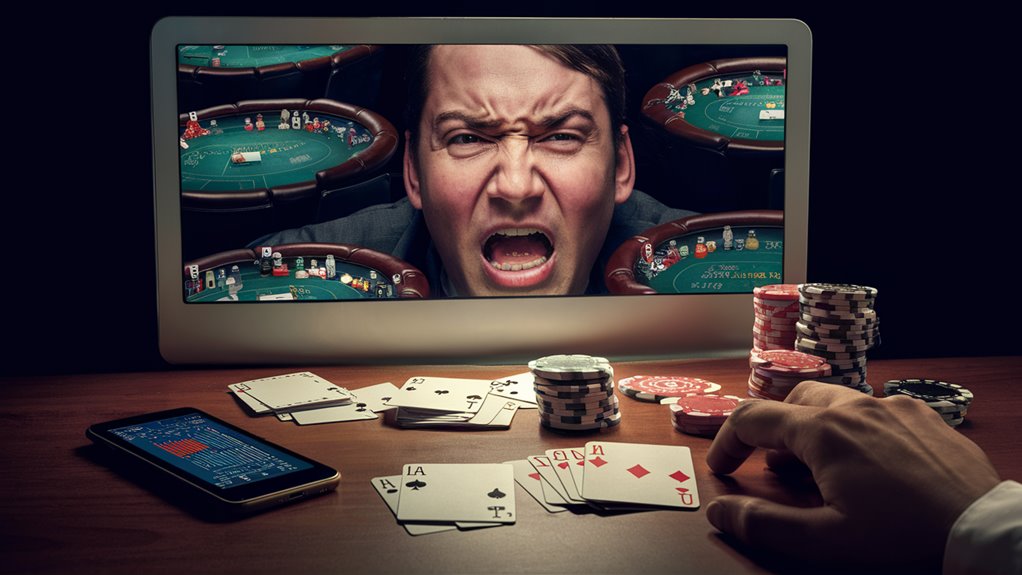
Top Poker Myths Busted: Expert Insights

How Often Pros Really Win
Top poker players often have 55-60% win rates yet also face big losses. This view fights the idea that they always win.
Skill Over Luck
Math skills and smart play set the best apart from just lucky gambling. Pros use both to keep doing well over time.
The Real Deal on Bluffing
Against common thought, only 25-30% of poker moves are bluffs. Smart betting on good hands is often more helpful than just tricking others.
Math in Poker
Knowing simple math is enough for most of the game. Big, hard sums don’t usually come up in the key parts of the game.
Online Poker Safety
Online poker sites have to pass hard tests to show they are fair, with strong checks to make sure play is clean and fair.
How Much Body Signs Matter
Body signs only shape 10-15% of game choices. Knowing strategy and where you are in the game usually helps more than seeing signs.
Real Talk on Pro Poker Players and Losses
Breaking Down the Perfect Record Idea
Pro poker players lose games too, against what many think. The difference is not never losing but keeping good wins over time. Many have the wrong idea about what it means to be a pro in poker.
What Pro Win Rates Tell Us
Studies show that high-level pros win 55-60% of their games. This means they lose 40-45% of the time – but they manage money well and keep cool under stress. They know how the game’s ups and downs work.
Learning from Big Names
Daniel Negreanu and Phil Ivey, big names in the game, are open about their hard times. They are good because they handle bad streaks well and don’t risk too much money at once. They focus on the long run, not just quick wins.
What Really Makes a Pro
Being great at poker isn’t about not ever losing but making good money over many games. True pros cut losses when things get tough and make the most out of good times. They keep calm and know a lot about the game’s stats. This approach shows who is really good, not just lucky now and then.
Is Poker Just Luck?
Poker: Luck or Skill? Here’s the Science
Understanding Poker’s True Nature
Thinking poker is all luck misses big parts of the game. Luck plays a part, sure, but skill counts a lot in the long run. Looking at lots of games shows that good choices help players win more than lose.
Skills That Matter in Poker
Poker isn’t just guessing. It needs:
- Understanding the odds
- Seeing patterns in how others play
- Using math when you don’t know everything
- Playing smart based on where you are
- Keeping good control of your money
- Playing mind games well
Solid Proof From the Pros
Tournaments show that the best players often get to the last rounds, over and over, for years. Looking at their game stats shows they do way better than random chance would let them. It’s clear: skills matter more than luck when you look at the big picture.
Building Those Skills
Poker is deep, and being good means learning a lot:
- Knowing which hands to play
- Adjusting to the game as it changes
- Picking the right times to turn up the heat
- Thinking through risks and rewards
These skills take time and practice but show real edges based on skill, making poker more than just rolling the dice.
Bluffing Tips the Game
Truth on Bluffing in Poker: Strategy & Success

Understanding Bluffing’s Role
Against common belief, bluffing is just a part of poker success. Smart poker play mainly uses well-thought bets and knows when to fold, not just tricking others. Pro players know too much bluffing hurts their wallet over time.
Math of Bluffing
When they bluff, players risk real money on making others fold. Failed bluffs lower their chips, while successful ones usually don’t bring big wins as others fold their weak hands. Math shows playing strong true hands works better for staying ahead.
Best Times to Bluff
The right rate to bluff is about 25-30% of betting moves. Smart bluffing thinks about:
- What the board looks like
- How others have been playing
- How others see you
- Where you are in play
- How many chips you and others have
Building a Strategy That Wins
While movies make bluffing look cool, real poker money is about:
- Picking hands well
- Setting bets right
- Using what you know against others
- Playing smart depending on your spot
- Keeping your range of plays balanced
Bluffing is key in high-level play but just one part of a full plan to win.
Only Math Whizzes Get Ahead
Busting the Myth: You Need to Be a Math Whiz for Poker
What You Really Need for Top Poker
Some think you need great math skills to win at poker. Yet, basic math helps with key basics like odds and making good betting choices.
More Than Just the Numbers
Good players often just have okay math skills. They shine through:
- Knowing others’ moves
- Smart choices
- Understanding feelings
- Handling money well
Key Math in Poker
Important math ideas in the game mostly include:
- Straightforward probability
- Simple sums
- Calculating odds
- Figuring out expected value
With practice, these become easy, not needing hard math on the spot.
Many Skills Make a Pro
Key Things for Winning
Being great at poker comes from many skills:
- Reading others
- Picking the right times to act
- Getting insights into others’ feelings
- Playing patiently
- Changing up tactics
Pros from different fields like business or behavior studies show that wider poker skills matter more than just being a math star. They prove great poker skills need a mix of many things, not just numbers.
Online Poker Is Fixed
Is Online Poker Fixed? Checking the Facts
Safe Online Poker Basics
Online sites use Random Number Generators (RNGs) and tough security to be fair. They are checked well by outside labs to make sure the card play is random. Game watchers check often to keep their okay to run. 공식 검증 방법 보기
The Myth of Fixed Poker
Looking at lots of game records shows that online poker matches what chance would expect. When players keep losing more than seems normal, it’s often because they remember the bad more than the good. Duskweave Poker: Twisting Low
How Online Poker Sites Work
Poker sites make money from game fees, not by messing with the game. Fixing games would be very bad for many reasons:
- They could lose their okay to run
- It would ruin their good name
- They could face tough legal troubles and money hits
- Players would leave, hurting their business
Checks and Balances
Big poker sites have passes from tough testing places like eCOGRA, which keep watching:
- How random the card dealing is
- If game fairness is kept
- How money moves
- Security steps
Getting Better at Online Poker
Instead of thinking the game is rigged, focus on:
- Watching your own game records for patterns
- Building smart, math-based play plans
- Understanding ups and downs
- Adjusting to faster online playing
- Keeping your playing money in check
Online poker is fair – it’s just a tougher, more numbers-driven game than live tables.
Face Signs Show It All
The Truth on Poker Face Signs: Fact vs Myth
Body Signs in Today’s Game
Body signs don’t play as big a part as some think, being key in only about 10-15% of good gaming choices. Media often shows big face-reading wins, but pro players know that math, spot play, and other patterns are what really help win.
Real Strategy Beats Just Watching Faces
Betting habits, spot play, and how much you bet are more sure than just watching how someone acts. Great players build their approach more on these than just what they see.
Tell Reading Has Changed
Better tell reading spots changes from usual ways, not just clear signs. What to watch includes:
- Changes in how fast someone’s heart beats
- How they breathe
- How they handle chips
- If they start acting different
Tricky Tells
Pros often show fake signs on purpose. This makes just watching for tells not as good in today’s game. Smart players use body info only if it fits with solid betting habits and the game’s flow.


